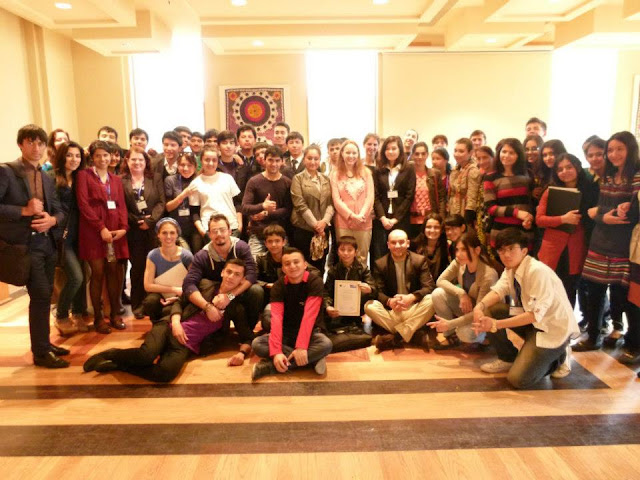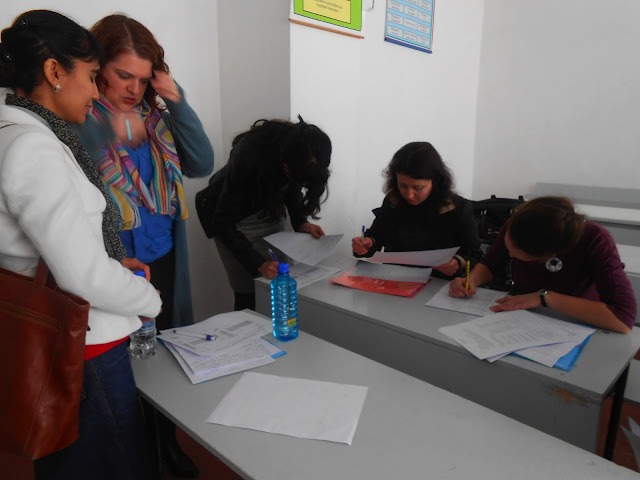As I pack
my things and look through all of my papers, I realize the range of themes we
covered in my Tajik lessons. I was lucky to have a teacher who prepared
interesting lessons for me. Though I must confess I cannot remember all of the
vocabulary, I wanted to share another lens for looking at Tajikistan, from
stories to culture to news.
In the
beginning I read a lot of fables:
- Ганҷи падар - The
treasure of father
- A man tells his two lazy sons that there
is treasure buried in their garden. He dies and the sons dig up the
garden. They don't find treasure, but they plant seeds. After three
months they harvest the fruit and vegetables and realize that they have
found the true treasure of their father.
- Лонаи мурғаконро ваирон накунем - Don't destroy birds' nests!
- A man wants to find partridge eggs to feed his
dogs, as well as to give a friend. He goes hunting for them, and a
mysterious old man hands him ten from his pocket. The man returns and
gives the eggs to his friend, but the next day the friend reports that he
accidentally dropped them and they were empty! He tried to find the old
man again, but could not, and understood that this was a message to stop
hunting.
- Боигарии аз ҳама бузург - The biggest riches
- An old man says to a boy, 'You are very rich,
but you don't know it!' The young boy says, 'You are crazy! You cannot
turn my hand into gold!' but the old man tells him that the riches of
gold and jewelry are nothing compared to health.
- Гурбаҳоро панд додани маймун - The monkey teaches cats a lesson
- Two cats are fighting over a piece of cheese.
They want to divide it, but can't decide how. They take it to the monkey,
who divides it unevenly. The cats complain, and the monkey takes a bite
out of the bigger piece, then from the other, back and forth until there
is none left. This is a lesson to them not to be greedy (and to solve
their problems themselves).
Then other short texts with less-obvious moral
lessons:
- Офатҳо - disasters
- This was nice because then I knew the words for
"earthquake" and "mudslide" when I experienced them.
- Рузи оила - Day
of the Family
- Because of rising divorce rates, the government
has a "family day" when older couples give advice/counseling to
newlyweds. I actually agree with the quoted older couple who say that
family starts from love and respect - but our ideas of respect may be
different.
- Абуали ибни Сино - Abduali ibn Sino
- The great scientist, mathematician, philosopher
known as Avicenna in Latinate Europe.
- Тоҷмаҳал - Tojmahal
- "But it's in India," you say. Yes,
but the Mughal court was part of the Persian-speaking world, and its
architects came from the Persian capitals of Samarkand and Bukhara.
- Муқаннаъ - Mukanna' or al-Muqanna
- I had never heard of this man before. Born Hoshim
puri Hakim in Merv, he led an uprising against the Arab rulers in Baghdad
in the 770s and 780s.
- Тўиҳо - weddings
- see separate post.
My teacher was at
Indiana University Bloomington, and helped put together their online learning
modules, which are really great. If you go to the CeLCAR
website, you can see the many themes for the Intermediate modules.
- Рамзҳои рангҳо
ва ракамҳо - Symbols of colors
and numbers
- White
and black have the same good/bad connotation that European culture
associates with them; red symbolizes health, and yellow symbolizes
sickness/weakness. Odd numbers are associated with mourning and
incompleteness, while even numbers are associated with happiness and
fulness. 40 is very important for a variety of traditions (sitting at
home for 40 nights after a birth, wedding, or death), but 13 is not bad
luck here.
- Шугун ва бовариҳои мардуми тоҷик - Superstitions and beliefs of Tajik people.
- Many
Tajik superstitions can be traced to Zoroastrian beliefs about the
elements, including lots of ideas about nails (if you cut them in a
friend's house, he will become your enemy) and hair (if hairs are left in
your comb, don't just throw them away - you must put them in a hole).
Then we discussed American superstitions, like if you spill salt you must
throw it over your shoulder. We put our teeth under the pillow for the
tooth fairy - here, they put lost teeth on the roof of the house.
Breaking mirrors is bad - but here you don't have 7 years' bad luck, just
that you cannot look at the pieces as you gather them up.
In the
spring I struggled through articles from Ozodi, the Tajiki service of Radio Free Europe/Radio Liberty. My struggles were not only because I didn't always do my
homework, but also because Tajik newspaper writing is very difficult. My
teacher has strong feelings about the journalists who "make up words"
that no one ever uses. I have had students saying that they struggle to read
the newspaper, because it has so many of these new Tajik words. (links go to the articles online in Tajik).
- Никоҳҳои барвақти фоҷеаидухтарони тоҷик - Early weddings of Tajik girls.
- This article talks about the problems of early
marriages, unofficial marriages, and the relationship between religion,
religious leaders, religious interpretation and the government.
- Forbes тоҷикистонро дар паҳлуи Нигерияву
Камбоҷа ҷо дод - Forbes
put Tajikistan between Nigeria and Kambodia.
- Every year Forbes magazine makes a list of the best countries to do business; in 2012 Tajikistan
was ranked 111 out of 141. I had to play a local businessman trying to convince
Warren Buffett (my teacher) to invest. This is difficult as an honest
salesman, given the country's rankings in corruption (128), tax burden
(133), monetary freedom (126) and personal freedoms (115). I had to
advise Mr. Buffett to check back after a few years.
- Тоҷикистони баъди соли 2015. Назаримардум.
- Tajikistan after 2015 - in people's opinion.
- In 2015 the UN's Millenium Development Goals are supposed to be "achieved", so this article is about people's answers to an online survey that the UN created asking what people think are the major problems in Tajikistan and what they think will happen in the future. The major problems people see are corruption, followed by low salaries and the problem of job creation. People want to improve health, education, and conflict prevention.













































